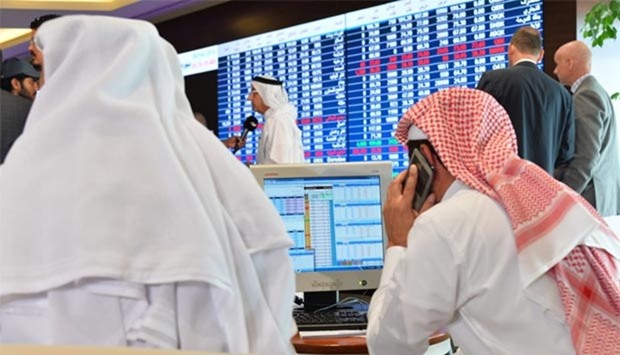Terming the margin trading, which commenced, as "positive"; QSE chief executive Rashid bin Ali al-Mansoori disclosed that the first day witnessed QR3mn worth deals.
Domestic institutions turned bearish as the 20-stock Qatar Index fell by a marginal 0.14% or 15 points to 10,357.33 points, notwithstanding the assurance from Qatar government on support to the private sector.
Trade turnover was on the decline amidst increased volumes in the bourse, whose year-to-date losses were seen at 0.69%.
A weak buying support from foreign institutions also played its part in keeping down the market, where telecom, industrials and banking stocks together accounted for more than 82% of the total volumes.
Islamic stocks declined faster than the conventional ones in the bourse, where local retail investors however turned marginally bearish, reflecting the introduction of margin trading.
Market capitalisation was down 0.08% or QR47mn to QR556.63bn as large cap equities fell 0.15% and small and microcaps (0.12% each); while midcaps were up 0.03%.
The Total Return Index fell 0.14% to 16,757.47 points, All Share Index by 0.12% to 2,860.94 points and Al Rayan Islamic Index by 0.24% to 3,900.41 points.
Insurance stocks shrank 1.06%, consumer goods (0.39%), real estate (0.27%), banks and financial services (0.06%) and transport (0.01%); whereas industrials and telecom gained 0.23% and 0.14% respectively.
Major losers included Qatar Insurance, Masraf Al Rayan, Qatar Islamic Bank, Mesaieed Petrochemical Holding, Barwa, United Development Company, Vodafone Qatar and Milaha; even as Industries Qatar, Ooredoo, Nakilat, al khaliji and Gulf International Services saw their stocks gain.
Domestic institutions turned net sellers to the extent of QR37.25mn compared with net buyers of QR33.23mn on October 5.
Non-Qatari institutions’ net buying weakened perceptibly to QR49.02mn against QR82.2mn the previous day.
Non-Qatari individual investors’ turned net sellers to the tune of QR0.26mn compared with net buyers of QR1.32mn on Wednesday.
The GCC (Gulf Cooperation Council) individual investors’ net selling strengthened to QR7.65mn against QR0.14mn on October 5.
However, local retail investors turned net buyers to the extent of QR1.53mn compared with net sellers of QR104.5mn the previous day.
The GCC institutions’ net profit booking weakened to QR5.35mn against QR12.1mn on Wednesday.
Total trade volume rose 13% to 6.09mn shares, while value fell 29% to QR203.57mn and deals by 2% to 2,351.
The telecom sector’s trade volume grew about 16-fold to 2.67mn equities and value by more than five-fold to QR37.11mn on 81% jump in transactions to 332.
The banks and financial services sector saw 24% expansion in trade volume to 1.15mn stocks and 64% in value to QR61.25mn but on 6% fall in deals to 764.
However, the insurance sector’s trade volume plummeted 92% to 0.09mn shares, value by 96% to QR4.58mn and transactions by 46% to 104.
There was 38% plunge in the industrials sector’s trade volume to 1.19mn equities, 34% in value to QR70.83mn and 10% in deals to 502.
The consumer goods sector’s trade volume tanked 35% to 0.15mn stocks and value by 42% to QR5.77mn; whereas transactions gained 54% to 219.
The real estate sector reported 18% decline in trade volume to 0.59mn shares, 27% in value to QR11.09mn and 4% in deals to 287.
The transport sector’s trade volume was down 4% to 0.24mn equities but on 76% increase in value to QR12.93mn. Transactions shrank 36% to 143.
In the debt market, there was no trading of treasury bills and government bonds.


